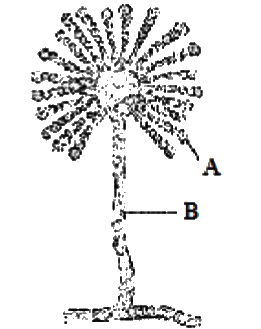Read the following statements carefully.
A. Studies suggest that first organisms that invaded land were plants.
B. Saltations are large mutations and directionless while Darwinian variations are small and directional.
C. Sauropsids were common ancestors of therapsids and thecodonts.
D. Homo habilis was the first hominid with brain capacity ranging between 650-800 cc. Choose the correct option w.r.t. True (T) and False (F) statements
To solve the question, we need to analyze each statement one by one and determine whether they are true (T) or false (F).
1. Statement A: "Studies suggest that the first organisms that invaded land were plants."
- This statement is true. The first organisms to colonize land were indeed plants, specifically bryophytes (like mosses). They adapted to terrestrial life and paved the way for other life forms.
Hint: Think about the history of life on Earth and the role of plants in terrestrial ecosystems.
2. Statement B: "Saltations are large mutations and directionless while Darwinian variations are small and directional."
- This statement is also true. Saltations refer to significant, often sudden mutations that can occur without a specific direction, while Darwinian variations are small, gradual changes that occur through natural selection, which is directional.
Hint: Consider the difference between large-scale genetic changes and the gradual process of evolution.
3. Statement C: "Sauropsids were common ancestors of therapsids and thecodonts."
- This statement is false. Sauropsids are indeed a group that includes reptiles and birds, but they are not the common ancestors of therapsids (which are ancestors of mammals) and thecodonts (which are early archosaurs). Instead, therapsids and thecodonts share a more distant common ancestor.
Hint: Review the evolutionary relationships between different groups of reptiles and mammals.
4. Statement D: "Homo habilis was the first hominid with brain capacity ranging between 650-800 cc."
- This statement is true. Homo habilis is known for having a brain size within this range, making it one of the earliest known hominids with a significant brain capacity.
Hint: Recall the characteristics of early human ancestors and their brain sizes.
Conclusion:
Based on the analysis:
- Statement A: True (T)
- Statement B: True (T)
- Statement C: False (F)
- Statement D: True (T)
Thus, the correct option with respect to the true (T) and false (F) statements is:
- A: T
- B: T
- C: F
- D: T
Final Answer:
A: T, B: T, C: F, D: T
- This statement is true. The first organisms to colonize land were indeed plants, specifically bryophytes (like mosses). They adapted to terrestrial life and paved the way for other life forms.
- This statement is also true. Saltations refer to significant, often sudden mutations that can occur without a specific direction, while Darwinian variations are small, gradual changes that occur through natural selection, which is directional.
- This statement is false. Sauropsids are indeed a group that includes reptiles and birds, but they are not the common ancestors of therapsids (which are ancestors of mammals) and thecodonts (which are early archosaurs). Instead, therapsids and thecodonts share a more distant common ancestor.
- This statement is true. Homo habilis is known for having a brain size within this range, making it one of the earliest known hominids with a significant brain capacity.
Based on the analysis:
- Statement A: True (T)
- Statement B: True (T)
- Statement C: False (F)
- Statement D: True (T)
- A: T
- B: T
- C: F
- D: T
A: T, B: T, C: F, D: T
Topper's Solved these Questions
Similar Questions
Knowledge Check
The first organisms that invaded land were
APlantsBFishesCInsectsDBacteriaChoose the correct option w.r.t TMV
ACapsomeres are arranged in polyhedral formBPossess non-infectious RNACBeijerinck found that they can pass through bacteria-proof filtersDCrystals consist largely of proteinsChoose the correct option w.r.t RNA.
APresence of thymine in place of unracilBAbsence of free 2'OH in sugarCMutates at faster rateDIs non-catalytic


